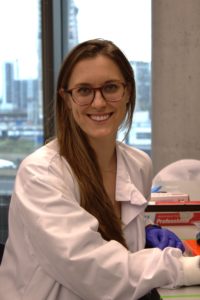Read Nuria’s open access Emerging Investigator article, A machine learning approach to predict cellular uptake of pBAE polyplexes, DOI D3BM00741C.
Check out our interview with Nuria below:
What aspect of your work are you most excited about at the moment and what do you find most challenging about your research?
I’m very excited about understanding how biomaterials interact with cells and tissues at a biological level, and how biomaterials’ properties can be leveraged to modulate gene expression. In that sense, tools like machine learning will be instrumental to process large data sets and unravel non-linear correlations that have not yet been identified. In the future, these concepts could become the basis of drugless therapies based solely on biomaterials and their power to restore gene expression of disease cells and tissues to that of healthy ones.
The most challenging part of the research is the multidisciplinary approach that it requires: biomaterials science and engineering, biology, data science and medicine. As such, a collaborative spirit is key to success.
Can you share one piece of career-related advice or wisdom with other early career scientists?
Well, I’m still learning how to be an early career scientist! But what I’ve learned so far is that it is very important to be resilient and kind – to others, but also to yourself. The academic path has more rejection than success, and at the end of the day it is key to believe in yourself and in your science.
Keep with all of Nuria’s research by checking out her lab’s web page or following her on LinkedIn or twitter @noliva77.











